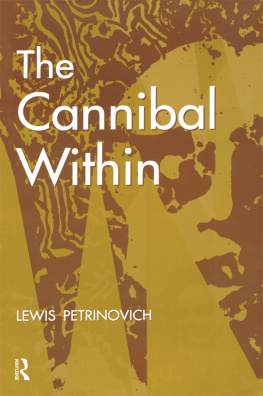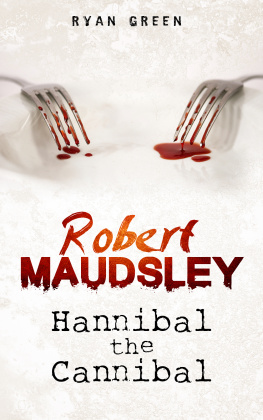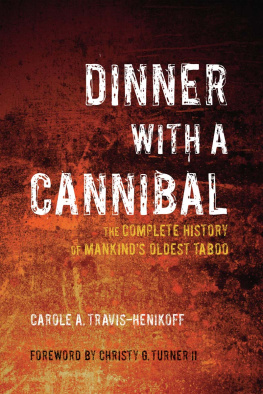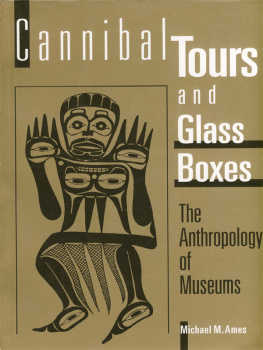THE CANNIBAL WITHIN
EVOLUTIONARY FOUNDATIONS OF HUMAN BEHAVIOR
An Aldine de Gruyter Series of Texts and Monographs
EDITED BY
Monique Borgerhoff Mulder Marc Hauser
Richard D. Alexander, The Biology of Moral Systems
Laura L. Betzig, Despotism and Differential Reproduction: A Darwinian View of History
James S. Chisholm, A Navajo Infancy: An Ethological Study of Child Development
Russell I. Ciochon and John G. Fleagle (eds.), Primate Evolution and Human Origins
G.A. Clark and C.M. Willermet (eds.). Conceptual Issues in Modern Human Origins Research
Lee Cronk, Napoleon Chagnon, and William Irons (eds.), Adaptation and Human Behavior. An Anthropological Perspective
Martin Daly and Margo Wilson, Homicide
Irenus Eibl-Eibesfeldt, Human Ethology
Richard J. Gelles and Jane B. Lancaster (eds.), Child Abuse and Neglect: Biosocial Dimensions
Kathleen R. Gibson and Anne C. Petersen (eds.), Brain Maturation and Cognitive Development: Comparative and Cross-Cultural Perspectives
Frederick E. Grine (ed.), Evolutionary History of the Robust Australopithecines
Barry S. Hewlett (ed.), Father-Child Relations: Cultural and Biosocial Contexts
Kim Hill and A. Magdalena Hurtado, Ache Life History: The Ecology and Demography of a Foraging People
Warren G. Kinzey (ed.), New World Primates: Ecology, Evolution, and Behavior
Jane B. Lancaster, Jeanne Altmann, Alice S. Rossi, and Lonnie R. Sherrod (eds.), Parenting across the Life Span: Biosocial Dimensions
Jonathan Marks, Human Biodiversity: Genes, Race, and History
Lewis Petrinovich, The Cannibal Within
Richard B. Potts, Early Hominid Activities at Olduval
Eric Alden Smith, Inujjuamiut Foraging Strategies: Evolutionary Ecology of an Arctic Hunting Economy
Eric Alden Smith and Bruce Winterhalder (eds.), Evolutionary Ecology and Human Behavior
Barbara Boardman Smuts, Sex and Friendship in Baboons
Patricia Stuart-Macadam and Susan Kend (eds.), Diet, Demography, and Disease: Changing Perspectives on Anemia
Wenda R. Trevathan, Human Birth: An Evolutionary Perspective
James W. Wood, Dynamics of Human Reproduction: Biology, Biometry, Demography
First published 2000 by Aldine De Gruyter
Published 2019 by Routledge
2 Park Square, Milton Park, Abingdon, Oxon OX14 4RN
52 Vanderbilt Avenue, New York, NY 10017
Routledge is an imprint of the Taylor & Francis Group, an informa business
Copyright 2000 Taylor & Francis
All rights reserved. No part of this book may be reprinted or reproduced or utilised in any form or by any electronic, mechanical, or other means, now known or hereafter invented, including photocopying and recording, or in any information storage or retrieval system, without permission in writing from the publishers.
Notice:
Product or corporate names may be trademarks or registered trademarks, and are used only for identification and explanation without intent to infringe.
About the Author
Lewis Petrinovich is Professor Emeritus, Department of Psychology, University of California, Riverside. Dr. Petrinovich is currently a resident of Berkeley, California.
Library of Congress Cataloging-in-Publication Data
Petrinovich, Lewis F.
The cannibal within / Lewis Petrinovich.
p. cm. (Evolutionary foundations of human behavior)
Includes bibliographical references and index.
ISBN 0-202-02047-9 (cloth : alk. paper) ISBN 0-202-02048-7 (pbk .: alk. paper)
1. Cannibalism. I. Title. II. Series.
GN409.P47 2000
394.9dc21
99-057940
ISBN 13: 978-0-202-02048-8 (pbk)
Why is a dedicated Neo-Darwinist writing a book on such an unlikely subject as human cannibalism? The topic has a lurid fascination and provokes at minimum a morbid interest in some, rising to a sense of revulsion in others (particularly when offered as a topic for dinner conversation). My initial interest in cannibalism was aroused when, in a previous book, I considered the question of whether it is morally permissible for people to eat animals of other species. That book, Darwinian Dominion: Animal Welfare and Human Interests (Petrinovich, 1999), dealt with moral, scientific, and practical issues regarding the various uses of animals of other species by humans. While thinking through issues regarding the permissibility of eating animals it occurred to me that it would be interesting to consider the question of whether it is ever permissible to eat humans, and if so under what circumstances. As I read about some of the well-known instances of survival cannibalism, and considered the archaeological evidence for cannibalism, I discovered that it has been a common occurrence throughout human historyso common that the subject merits careful review. Because the length of Darwinian Dominion was becoming excessive, I eliminated the material on cannibalism, and the present book is the result.
After a cursory examination of the literature, I decided something significant can be revealed about evolved aspects of human morality through an examination of cannibalism. This revelatory significance is sufficient to justify careful inquiry, particularly into survival cannibalismthat done by starving people in order to avoid imminent death. When such starvation occurs the social rules that apply in normal times are no longer relevant, and people revert to more basic survival behaviors. The title of the book reflects my belief that cannibalism is not a pathology that erupts in psychotic individuals, but is a universal adaptive strategy that is evolutionarily sound. The cannibal is within all of us, and cannibals are within all cultures, should the circumstances demand the appearance.
The major instances in which survival cannibalism occurred convinced me that there is a consistent pattern and a uniform regularity in the order in which different kinds of individuals are consumed. In considering who eats whom, when, and under what circumstances, this regularity appears, and it is consistent with what would be expected on the basis of evolutionary theory I conclude that starvation cannibalism is not a manifestation of the chaotic, psychotic behavior of individuals driven to madness, but reveals underlying characteristics of evolved human nature.
Some are of the opinion that cannibalism has never taken place among normal humans, particularly those in civilized societies, and questions have been raised as to whether it ever existed, even among savages (note that the scare quotes around those words signal that there are definitional and political problems lurking in the wings). I review as much of the extensive literature concerning survival cannibalism as I could find. To address the issues involved in cannibalism more completely I considered instances of ritual cannibalism, and was surprised to find how widespread it has been throughout human history and in most regions of the world. Not being an anthropologist or ethnographer, I made no attempt to determine why and under what circumstances ritual cannibalism is practiced. That task remains a fascinating one for a qualified expert.
I am grateful for the aid and comfort I received from a number of friends and colleagues. I had many discussions regarding the project with my former students and now colleagues A. J. Figueredo, University of Arizona, and Patricia ONeill, University of Mississippi, both of whom read the manuscript in one form or another. Marc Hauser, Harvard University, encouraged me to begin and complete the book, served as academic editor for Aldine, made me realize that my first attempt was off the mark, headed me in a more profitable direction, and straightened out a major problem in the final draft. His continuing advice was to adopt a consistent voice and not to try to address too many audiences at oncein other words to be less schizophrenicand I think I was able successfully to bridge the gap between the scholar and the general reader.











